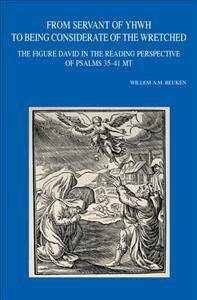
Je cadeautjes zeker op tijd in huis hebben voor de feestdagen? Kom langs in onze winkels en vind het perfecte geschenk!
- Afhalen na 1 uur in een winkel met voorraad
- Gratis thuislevering in België vanaf € 30
- Ruim aanbod met 7 miljoen producten
Je cadeautjes zeker op tijd in huis hebben voor de feestdagen? Kom langs in onze winkels en vind het perfecte geschenk!
- Afhalen na 1 uur in een winkel met voorraad
- Gratis thuislevering in België vanaf € 30
- Ruim aanbod met 7 miljoen producten
Zoeken
From Servant of Yhwh to Being Considerate of the Wretched
The Figure David in the Reading Perspective of Psalms 35-41 MT
Wam Beuken
€ 147,95
+ 295 punten
Omschrijving
This study attempts an investigation of Psalms 35-41 in the Masoretic tradition from two viewpoints and in the wake of current research on the Psalter. Firstly, the common opinion that they form a sub-unit of their own within the structure of the first 'book' of the Psalter (Psalms 3-41) is verified on the basis of their concatenation and pragmatics. The deepened insight leads to the conclusion that the bundle consists of two clusters, Psalms 35-37 and Psalms 38-41, each of which deals with the question of how to understand God's tolerance towards the wicked, and how readers, following in the psalmist's footsteps, might live on with that knowledge. The two clusters also provide evidence of an advancing argument in two parallel moves that are covered by the book's main title: 'From Servant of YHWH to Being Considerate of the Wretched'. Secondly, the Davidisation of the psalmist throughout the whole bundle is examined, not insofar as it is limited to explicit references to the historical David (especially in psalm headings), but also by feasible, lexical (Hebrew) analogies with the vita David in 1-2 Samuel (with 1 Kings 2). In this way, intertextuality is envisaged as a literary process that is initiated by the author and can be continued by well-informed readers. The monograph's subtitle renders this as 'The Figure David in the Reading Perspective of Psalms 35-41 MT'.
Specificaties
Betrokkenen
- Auteur(s):
- Uitgeverij:
Inhoud
- Aantal bladzijden:
- 187
- Taal:
- Engels
- Reeks:
- Reeksnummer:
- nr. 305
Eigenschappen
- Productcode (EAN):
- 9789042941144
- Verschijningsdatum:
- 26/02/2020
- Uitvoering:
- Paperback
- Formaat:
- Trade paperback (VS)
- Afmetingen:
- 160 mm x 240 mm
- Gewicht:
- 471 g

Alleen bij Standaard Boekhandel
+ 295 punten op je klantenkaart van Standaard Boekhandel
Beoordelingen
We publiceren alleen reviews die voldoen aan de voorwaarden voor reviews. Bekijk onze voorwaarden voor reviews.









